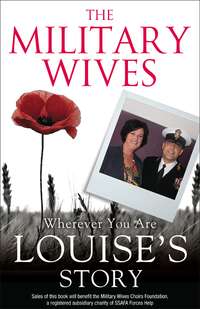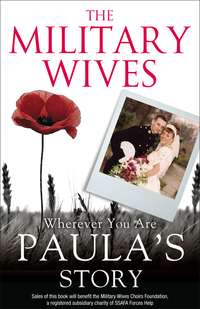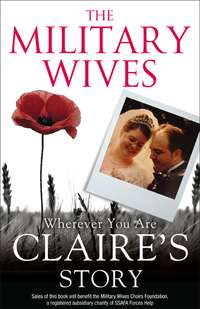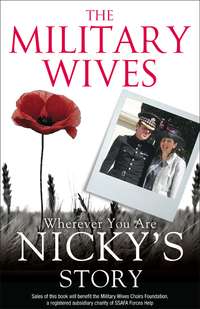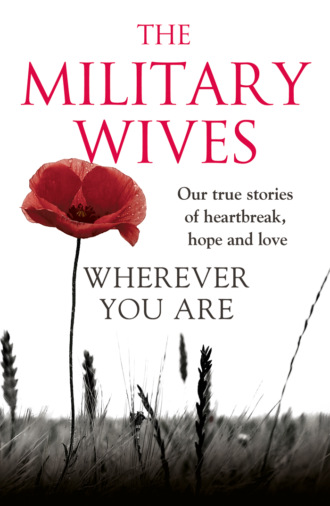
Полная версия
Wherever You Are: The Military Wives: Our true stories of heartbreak, hope and love


Contents
Cover
Title Page
About the Military Wives Choirs Foundation
Introduction
OUR LIVES
Katherine Catchpole
Sarah Hendry
Mechelle Cooney
Nicky Scott
Emma Hanlon-Penny
Louise Baines
Nicky Clarke
Lauren Bolger
Claire Balneaves
Kelly Leonard
Rachael Woosey
Alison Burston
Carol Musgrove
Paula Mundy
Jacqueline Beardsley
Larraine Smith
Kristen Gilbert
Sharon Bristow
Kerry Tingey
Sally Wilkinson
Caroline Jopp
Rachel Newey
Sharon Farrell
Stacey Hardwell
Julie Sanderson
FINDING OUR VOICE
Nicky Clarke
Sharon Farrell
Caroline Jopp
Alison Burston
Kerry Tingey
Sarah Hendry
Katherine Catchpole
Nicky Scott
Rachel Newey
Emma Hanlon-Penny
Rachael Woosey
Kelly Leonard
Kristen Gilbert
Sharon Bristow
Claire Balneaves
Louise Baines
Mechelle Cooney
Larraine Smith
Jacqueline Beardsley
Julie Sanderson
Stacey Hardwell
WHEREVER YOU ARE
Nicky Scott
Katherine Catchpole
Louise Baines
Kelly Leonard
Larraine Smith
Sarah Hendry
Rachael Woosey
Mechelle Cooney
Rachel Newey
Lauren Bolger
STRONGER TOGETHER
Paula Mundy
Nicky Clarke
Caroline Jopp
Carol Musgrove
Sally Wilkinson
Picture Section
Acknowledgements
Copyright
About the Publisher
About the Military Wives Choirs Foundation
Supporting the women who support our troops
The Military Wives Choirs Foundation is a network of choirs that reaches across the whole military community. It has been established to provide support, guidance and funding for individual choirs, but first and foremost to bring women closer together through singing.
Following the phenomenal success of ‘Wherever You Are’, which raised more than half a million pounds for military charities, those involved set out to create a wider network that could support wives, partners and women serving in the forces, and would leave a lasting legacy. In particular, the women from the first choirs wanted to share the enjoyment and pride that they had already experienced through their own choirs. The Military Wives Choirs Foundation has enabled them to do just this.
Through its growing network, the Foundation is building something that brightens lives, strengthens military communities and enables hundreds of women to experience the enjoyment and friendship that comes from being part of a Military Wives Choir. The Foundation is now a registered subsidiary of SSAFA Forces Help.
Registered Charity Number 1148302. Established 2012.
Introduction
We felt the poppy petals settling on our hair, our faces, our new black dresses. A large screen showed a roll call of men lost in war during the past 12 months, some of them men we knew as friends of our husbands, men who never made it to the homecoming, men who would never see their children grow up.
Ahead of us, and right in our eyeline, stood the war widows, the brave contingent of women who had taken part in the Festival of Remembrance at the Royal Albert Hall to celebrate the lives of their lost husbands. These women were living our worst nightmare; they had heard the knock on the door that we all dread. If they could keep strong, so could we; if they didn’t break down, neither would we. We battled to hold our tears back.
But it was a very long two minutes.
This, we thought, was what it was all about. Our choir, the Military Wives Choir, had borne us up and carried us through the long, gruelling seven-month tour our men had just completed in Afghanistan. It had given us a focus, it had broken down barriers, it had formed us into a tight and supportive community.
And now we had made the world know of our existence. Earlier in the evening we had sung our beautiful song, written especially for us from the words of the letters and messages we share with our men when their lives are in danger. And as we poured out the song, we told everyone that there is another branch of the armed forces: the military wives who stay behind, adding our quiet strength to our men’s courage.
‘Wherever you are, my love will keep you safe,’ we sang, and every one of us thought of the man in our life, and our gratitude that once again a tour was over, and he was back. We knew, from the reception there at the Royal Albert Hall, that our song touched the hearts of others, reaching out beyond our own private relief and pride.
What we did not know, at that moment, was how it would also touch the hearts of an entire nation, and how our lives would be transformed by the whirlwind of fame that was to come.
But we did know that music and singing are such powerful drugs that our choir would live on, even after the television cameras were gone and after Gareth Malone, our inspirational choirmaster, had kissed us all goodbye. And, perhaps, today, despite everything else that has happened, our greatest achievement is that we have helped spread the healing, bonding and uplifting spirit of the choir to military bases all across the land, and in Germany and Cyprus.
From now on, military wives everywhere will find each other in choirs, and will form there the sort of friendships that will last a lifetime, and carry them through the anxiety and fear we all share when our men are away from home.
We are proud of so many of the things we have done, but this ranks at the top – above the number one single, the hit album, the trip to Downing Street and singing at the Queen’s Diamond Jubilee concert, as well as all the other celebrity moments.
We are thrilled and delighted, too, that the public have taken us to their hearts: we have never asked for sympathy, just support in our lives which are dedicated, in turn, to supporting the men who keep Britain safe.
WORDS WE USE
We use words and phrases that we pick up from our men – military terms and slang that you may not understand. Here’s an explanation of the ones in this book:
Afghan A shortened version of Afghanistan
BFBS British Forces Broadcasting Service
Blueys Letters on special thin airmail blue paper
CO Commanding Officer
Comms Communications, covering everything – phone calls, emails, letters
Comms are down is a phrase we dread: it means that something serious, a death or serious injury, has happened
Contact Enemy fire
E-blueys Email version of blueys, sent to a central email reception and then forwarded on
FOB Forward Operating Base: a secured position away from the main base
Headley Court The Defence Medical Rehabilitation Centre, where many of the most serious military casualties go after they leave hospital to continue their recovery
Hive The welfare and information centre for wives and families on a military base
March in/out The takeover or handover inspection of married quarters when we arrive or leave
MERT Medical Emergency Response Team
NAAFI Navy Army and Air Force Institute
Patch Name given to any military housing estate
POTL Post Operation Tour Leave: the time off the men get when they return from a tour
Pre-Op The months of preparation before an operation, or tour
PTI Physical Training Instructor
R & R Rest and recreation: the break, usually two weeks, the men get in order to come home in the middle of a long tour
REME Royal Electrical and Mechanical Engineers
SAR Search and Rescue
Selly Oak The hospital in Birmingham that hosted the Royal Centre for Defence Medicine, where injured troops are treated; now hosted by the new Queen Elizabeth Hospital in Edgbaston
SSAFA Soldiers, Sailors, Airmen and Families Association: a charity that helps serving and former members of the armed forces, their families or dependents
TRIM Trauma Risk Management: designed to identify and help forces personnel at risk after traumatic incidents, delivered by trained people already in the affected individual’s unit
UNDERSTANDING RANKS
ARMY AND ROYAL MARINES
Private
Lance Corporal
Corporal
Sergeant
Staff Sergeant
Colour Sergeant: the same rank as Staff Sergeant, used in the Royal Marines and some regiments
WO2: Warrant Officer class 2 (Sergeant Major)
WO1: Warrant Officer class 1 (Regimental Sergeant Major)
OFFICERS’ RANKS
2nd Lieutenant
Lieutenant
Captain (LE Captain is someone who has worked up through the ranks; LE stands for Late Entry)
Major
Lieutenant Colonel
Colonel
Brigadier
Major General
Lieutenant General
General
NAVY (NON-COMMISSIONED RANKS)
Rating
Leading Hand
Petty Officer
Chief Petty Officer
Warrant Officer
ROYAL AIR FORCE (NON-COMMISSIONED RANKS)
Leading Aircraftman
Senior Aircraftman
Corporal
Sergeant
Flight Sergeant
Warrant Officer
OUR LIVES
‘He tells me I’ve got to be strong for the children, and he’s right. But who’s going to be strong for me?’
We don’t just marry a man we love: we marry a way of life. Our lives are dominated by his career, in a way that rarely happens outside the military. We move home, on average every two years, as he is posted from camp to camp. Our children are uprooted; our own careers and ambitions go on hold. We live in houses we did not choose, we make friends who move on as soon as we have become close. It’s not an easy life, and that’s without the biggest challenge of all: our men leave home to go to the world’s most dangerous places, leaving us behind to nurse our loneliness and learn to be both mother and father to our children.
When they go, we struggle to put a brave face on it. We don’t want to distract him: we’ve heard the saying ‘If his head’s at home, he’ll struggle out there.’ So we accept, and are even glad, that as he prepares to go he seems to shut us out of his mind. When he’s gone, we shake ourselves out of our misery and get on with it: we feed the children, walk the dog, go to our jobs, all the time blocking out thoughts and fears about what he is facing.
Our men chose this way of life; they love it and thrive on it. We made a choice too: to be with them. We hear from civilian friends and family: ‘You knew what you were letting yourself in for,’ or ‘What did you expect when you married a man in uniform?’ But the truth is that most of us did not know what we were getting into. We had only the haziest idea of military life when we walked down the aisle and stood proudly next to our man, splendid in his dress uniform, at the altar.
We are not complaining. Military wives are a stoical band: we get on with it.
Here, in this book, are the stories of a few of us. We don’t claim to speak for all military wives, but we are a cross section: we are women of different ages, with husbands in different services, and of different ranks. These are very personal stories and, by telling them, we hope that all wives will find something they recognise and can relate to. We also hope that anyone who has no experience of military life will read this and understand more of what it is like to marry into the services.
Katherine Catchpole
As soon as I heard his voice I knew something was wrong.
‘All right, babes?’ he said. ‘I don’t want you to panic, but I’ve had a bit of an accident.’
My husband, Andrew, was phoning from Afghanistan, on his first tour out there.
The bottom fell out of my stomach when I heard the word ‘accident’, but in my head I could hear this running commentary: he must be all right, as he’s talking to me. He told me he was in hospital with a suspected broken leg. When he put the phone down, I had no idea what to do. I’d gone to stay with my mum in Watford for a few days, taking with me our son Freddie, who was two, and I’d been changing Freddie’s nappy when the phone rang. I didn’t have an information pack with all the emergency numbers, and as we lived in Yeovil, but Andrew was serving with a unit from Plymouth, I didn’t know who to ring. In the end, all I could think of was to ring a friend who had been posted to Germany, and she promised to try to find out for me. There is an official drill, and I should have been informed, but somehow I’d dropped off the radar. My friend texted me to say she was trying to get some information, but I had a terrible night.
The next day I had a phone call from Andrew again. ‘All right, babes? I don’t want you to panic, but I’ve had an accident …’
By now alarm bells were ringing loudly: I hoped he’d got concussion and not a more serious head injury, but he clearly didn’t remember ringing me the day before, and I still hadn’t heard anything official. Eventually I got through to the right welfare number, but there seemed to be no record of him having an injury.
The next day, he rang again: ‘All right, babes? I don’t want you to panic …’
I was really panicking. I asked him if there was anyone else near the phone who could talk to me, but he said the nurse had just wheeled him over and left him there. I was getting desperate, especially when he told me he had a bad headache.
Finally, that afternoon, a liaison officer rang me. Looking back, I should have been making more of a fuss, but I just didn’t know how to. Now I don’t go anywhere without all the right numbers with me.
He was flown back to Selly Oak Hospital, in Birmingham (the centre for treating wounded servicemen). I was told that he had leg, arm and head injuries, caused by an accident when he was on a quad bike.
My dad drove me up to Birmingham while Mum looked after Freddie. When I saw Andrew he had a massive gouge in his head and a long line of stitches up his left arm; then they operated and put pins and plates in his ankle. There were bits of gravel stuck in his face, and where he had been badly shaved there were tufts of hair all over his chin. He was ashen grey, with bags under his eyes, and he looked 15 years older. But he was so pleased to see me. We cuddled and he told me he had a thumping headache.
After the relief of seeing him and holding him, I started crying and berating him. All that emotion, the relief, the fear, everything I’d held in while I didn’t know what had happened, exploded.
‘How could you do this to me? You’ve put me through hell,’ I said.
He was half-laughing, and then he grabbed me and said, ‘I’m really sorry.’
Part of me was happy that at least he was now off the tour. But being what he is, he told me straightaway that he wanted to get back out there. Although I would have loved him to stay at home, I know him well enough to realise he would not be happy if he didn’t get back out, and he would feel he’d let the others down.
So when he got home from hospital I used my nursing skills to help with the physio. I arranged private physio, acupuncture and massage for him, and then worked with him on the exercises.
He got back out there for the last six weeks of the tour. It was important to him. In a funny way, I was happy to see him go because it meant so much to him. He says it was down to me that he recovered well enough in time. ‘You fixed me,’ he says. He was elated to have qualified for the tour medal, and that feeling helped him get over the tour better than usual, although it was still a difficult time.
That was my worst experience as a military wife. Looking back, I was so green when I first met Andrew, a few years earlier. I had no idea what it was all about. It all started with a kiss at the end of a party. The town I come from, Watford, has no military connections and I didn’t have a clue about life in the forces; I didn’t know anyone who was serving. But I’m a big believer in fate, and I’m sure fate had a hand in bringing me and Andrew (who is known as ‘Catch’ to all his mates) together.
I was 18 and training to be a nurse when a friend persuaded me to go to a 21st birthday party. She planned to set me up with a local lad. I was feeling ill, with raging tonsillitis, and I nearly didn’t go. I wasn’t attracted to my blind date, and to be honest I didn’t feel well and didn’t want to be there, so I was trying to make my excuses to get home to bed when Andrew arrived late at the party, after returning home from a posting in Brunei.
He nearly didn’t go that night, and I nearly left just before he arrived. We almost didn’t meet.
A couple of months after we started going out, he went on a three-month tour of the Mediterranean, sailing to France, Spain, Italy, Cyprus and Egypt. I learnt he was going from one of his mates. He was so casual about it, and I was distraught. I bought a big map and put it on the wall of my bedroom, and I cut out a little paper ship, which I moved about with pins, following his route. I sobbed all the time, saying to Mum, ‘I don’t think I can do this,’ and playing our song, ‘I Wanna Be the Only One’ by Eternal, over and over. I had a wall-chart calendar and I was crossing the days off with a big red pen. The only thing I did was go to university; the rest of the time I was in my bedroom, being miserable.
Mum said, ‘You’ll have to toughen up. You have to live your own life when he’s away.’
I wailed, ‘But I don’t want to …’
And he wasn’t even anywhere dangerous! I really dragged it out. Now I’d just be glad he was going somewhere safe.
Early on, he gave me a catchphrase that covers everything that military life throws at us: ‘It’s life in a green suit, babes, life in a green suit.’ It covers all the problems his job brings with it, and if ever I say anything about his life my family repeat it back to me. I’ve learnt to accept it.
I fell in love with the man, and he is the job. It’s his life. It runs through his blood, and he is the man I love. For the first three years we were together I stayed at home in Watford, doing my training, and we saw each other whenever we could.
When he was away I used to go out with friends, but I always felt like a gooseberry because they had their boyfriends with them. Someone would ask me how long it was since I’d seen him and that would set me off. ‘It’s been 70 days, 8 hours …’ – even down to the minutes. It was like a digital clock in my head.
I’m a Cinderella nut so we had a huge Cinderella-themed wedding, complete with glass coach and glass slippers, and he was my Prince Charming, in uniform. Afterwards we moved together to Portsmouth, to a top-floor flat on a military patch.
My family couldn’t believe I was the one who moved away: I’m such a home bird. I know it doesn’t sound far, Watford to Portsmouth, but for me then it seemed a long way. Where I grew up I had my mum and dad and little sister, my big sister and her husband round the corner, my nan and my aunties and all my school and nursing friends nearby, and Andrew’s family not far away – I felt I was going to the other end of the country. It was a really big wrench.
At first we were welcomed by the neighbours. But as soon as Andrew put his marine uniform on they ignored us. I didn’t know why. I couldn’t understand – and I still can’t – why there are rivalries between different branches of the armed forces. A bit of friendly rivalry is one thing, but we heard about social things that we weren’t invited to, and that really hurt.
Most of those around us were naval people. I’d no idea a uniform could make such a difference. I was used to people being friendly; I’m a friendly person myself. Now I’d be tougher. My attitude is: I’m Katherine, I’m not a rank or a number. Or I’d mentally just say, ‘Stuff you.’ Luckily I had my job – I was doing a midwifery course in Southampton – and we made friends through that.
We moved to a house in Taunton a week before Andrew deployed for Iraq, and I unpacked the boxes while he went through his joining routine. I knew nobody. I didn’t even know where Tesco was. Luckily, the following week I started work, which helped me cope with him going somewhere dangerous for the first time since we’d met. It was a steep learning curve: a new town, a new home and all the worries of him being in a war zone. Once I got sorted it was, socially, a much better posting, and for the first time I made really good friends with women who were in the same boat, with their men out there too. It was my first taste of how supportive and strong a group of military wives can be.
It was meant to be a three-month tour, but it was extended several times, and he ended up serving seven and a half months out there. That was difficult to deal with. When he got home, he had changed, mainly because it was his first dangerous posting since we’d been together.
I’d always said I wanted children one day, but he had said he wasn’t ready. His parents had split up, and he was very conscious of not wanting to repeat that pattern. He’s a big softie to me, but at work he’s a textbook marine: he eats, sleeps and breathes it. It took him a few weeks to get over that tour, to come home mentally. Then, one night in bed, he told me that he’d never thought he could miss someone as much as he had missed me when he was away. For a moment I was a bit insulted: we’d been married three or four years by then, and I’d known before he went how much I would miss him.
He said, ‘I’m not very good at explaining things, but I never thought I could love you more than I already did. I never thought it could hurt as much as it did, missing you. You were the part of me I couldn’t get away from.’
He was so serious that I made a little tent out of the bedclothes and used my phone for a light to see his face.
Then he said: ‘I want us to have children. I’m ready. I realised out there, missing you so much that it was a pain in the pit of my stomach, that it doesn’t matter about anyone else. You and me are what we are. When I’m over this tour, back to being the normal me, I’d like to try for a baby.’


